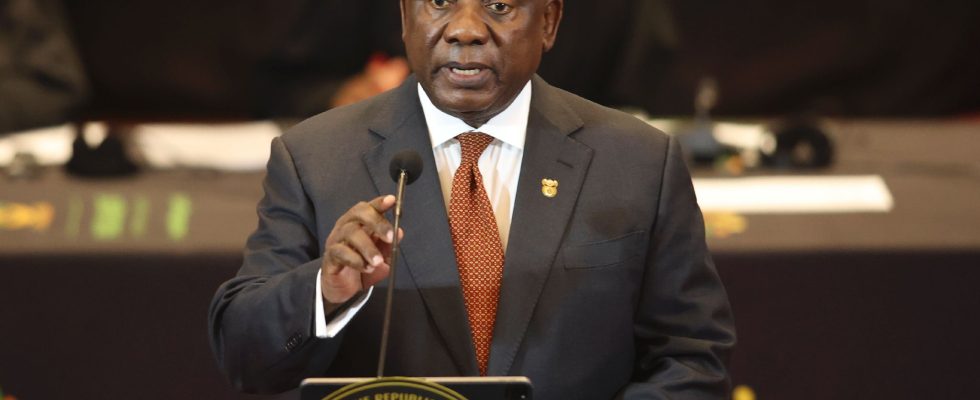While Kiev has launched a counter-offensive that promises crescendo material losses, its NATO allies are under pressure to replace Western weapons destroyed on the battlefield over time and provide mass ammunition, without damaging their own defense tool.
Brandishing in recent days as a trophy photos of damaged or abandoned American and German tanks, Russia claims to have destroyed 25% to 30% of Western armaments received by Ukraine. A figure undoubtedly greatly inflated, but impossible to verify independently.
The only certainty: the Ukrainian forces are suffering losses while trying to break through the enemy defense lines. According to the specialized site Oryx, which lists these losses from photos or videos taken on the battlefield, Kiev lost 4 German Leopard tanks recently delivered, 2 French AMX-10 RC FR armored reconnaissance vehicles and more than 70 combat armored vehicles. western infantry.
An African peace mediation launched
An African mission is expected this Friday, June 16 in Kiev, then in Saint Petersburg the next day, for a peace mediation aimed at resolving the conflict between the two countries, even if the last minute withdrawal of several members of the delegation darkens the chances of success.
Four African heads of state, a prime minister and a special envoy are due to start talks with Ukrainian President Volodymyr Zelensky, then his Russian counterpart Vladimir Putin. The South African Presidents Cyril Ramaphosa, Senegalese Macky Sall, Zambian, Hakainde Hichilema and Comorian Azali Assoumani, at the head of the African Union since February, have confirmed their participation.
As specified The world, Thursday evening, Congolese national television announced that President Denis Sassou-Nguesso, whose participation was uncertain, will ultimately not be on the trip. He will be represented by his chief of staff, General Florent Ntsiba. “Degraded situation on the ground, absence of heads of state, the conditions do not seem to be in place for a peaceful and constructive dialogue”, told RFI one of Denis Sassou-Nguesso’s relatives.
However, this mediation intervenes in the midst of the Ukrainian counter-offensive with an intensification of the fighting on the ground. “In times of escalating conflict, the search for a peaceful solution must be accelerated at the same time,” Cyril Ramaphosa said in a statement on Thursday. “We want to start discussions […] to see if through joint efforts it would be possible to move closer to peace in Ukraine,” said Ukrainian Foreign Ministry spokesman Oleg Nikolenko.
For the United States, Ukraine has the capacity to continue its offensive
Ukraine still has sufficient capability and firepower to carry out its counter-offensive despite initial losses, US Defense Secretary Lloyd Austin said Thursday after a meeting at NATO headquarters. with the Ukrainian Defense Minister.
“It’s a war. So we know there will be damage on both sides,” he said during a press briefing after a meeting of the members of the contact group. for Ukraine. On this occasion, Oleksiy Reznikov and the Ukrainian military commanders briefed the Alliance countries and their partners on the situation on the ground and outlined their military needs.
Russian President Vladimir Putin claimed his forces were repelling the offensive and that Ukrainian losses were “catastrophic”. “The Ukrainians still have a great fighting capacity, a great fighting power,” he said. Lloyd Austin insisted on the ability of the Ukrainians to “recover and repair damaged equipment”.
“War is unpredictable and we will continue to provide Ukraine with what it needs to succeed,” he said. “The offensive is in its early stages. The fighting is very violent and it is likely to take a long time,” warned General Mark Milley, Chief of Staff of the United States Armies.
Zaporizhia power plant: the “serious” but stabilized situation
The situation is “serious” but in the process of stabilization at the Ukrainian nuclear power plant in Zaporizhia after the destruction of a dam, said Thursday the director of the International Atomic Energy Agency (IAEA), Rafael Grossi.
“We can observe on the one hand that the situation is serious, the consequences are there and they are real”, explained Rafael Grossi after spending three hours at the Zaporijia power station, occupied since last year by the Russians. “At the same time, measures are being taken to stabilize the situation,” he added, without specifying what these measures were.
The visit of the head of the IAEA was notably intended to determine whether this installation had been endangered by the destruction of the Kakhovka dam on the Dnieper, the great Ukrainian river, whose water was used to cool its six reactors. Rafael Grossi, whose third trip to this place since the start of the war, said that the nuclear power plant in Zaporizhia, the largest in Europe, had “enough water”.
The plant has been the target of repeated bombings, which Moscow and Kiev blame each other for, and has been cut off from the electricity grid on several occasions, raising concerns about its safety.
